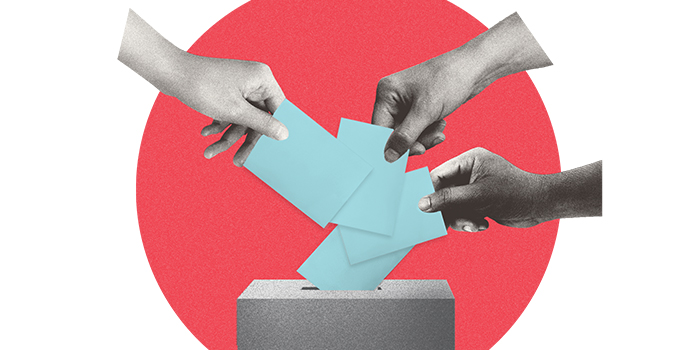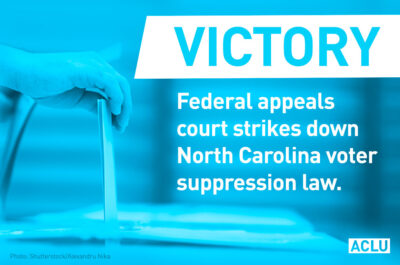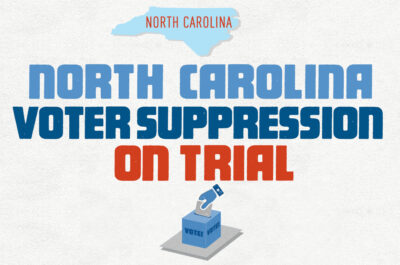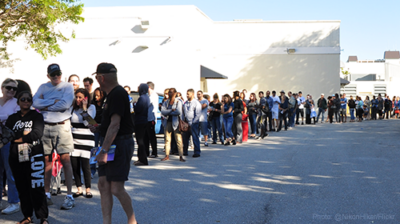
League of Women Voters of North Carolina, et al. v. North Carolina
What's at Stake
The American Civil Liberties Union, the ACLU of North Carolina Legal Foundation, and the Southern Coalition for Social Justice filed a lawsuit challenging North Carolina's voter suppression law the very day it was signed by Gov. Pat McCrory in August 2013. The suit targets provisions of the law that eliminate a week of early voting, end same-day registration, and prohibit "out-of-precinct" voting. It seeks to stop North Carolina from applying these provisions, arguing that they unduly burden the right to vote and discriminate against African-American voters, in violation of the U.S. Constitution's equal protection clause and Section 2 of the Voting Rights Act of 1965.
Stay informed about our latest work in the courts.
By completing this form, I agree to receive occasional emails per the terms of the ACLU's privacy statement.
Summary
The lawsuit was filed on behalf of several individual North Carolinians who face substantial hardship under the law, and on behalf of organizations whose efforts to promote voter participation in future elections will be severely hampered if the measure takes effect.
North Carolinians use early voting in vast numbers. During the 2012 election, 2.5 million ballots were cast during the early voting period, representing more than half the total electorate. More than 70 percent of African-American voters utilized early voting during the 2008 and 2012 general elections.
For many voters, the choice is between early voting or not voting at all. Early voting provides flexibility in finding time to vote, and significantly eases the burden of arranging transportation to a voting site. This is particularly critical for low-income voters, who are more likely to have hourly-wage jobs that don’t afford them the time to get to the polls on Election Day or during common work hours. Work, combined with child-care responsibilities, places great demands on voters living in poverty. Poverty in North Carolina is higher among African Americans, meaning a reduction in early voting opportunities will disproportionately impact voters of color.
Eliminating same-day registration and out-of- precinct voting imposes hardship and silences the people’s voice. Until 2014, North Carolinians could register, or update their registration information and vote, in one trip to an early voting site. In both 2008 and 2012, approximately 250,000 people did so. African Americans disproportionately relied on same-day registration in both elections. As for out-of precinct voting, for over a decade voters who cast a ballot in the wrong precinct could still expect to have their votes counted for races such as governor and president. In 2016, the law’s photo ID requirement will become effective, creating another barrier to exercising the right to vote. The law eliminates these opportunities to register, vote and have votes count, effectively disenfranchising countless North Carolinians.
On August 8, 2014 the district court denied plaintiffs application to enjoin these provisions before the 2014 election, but on October 1, 2014, the Fourth Circuit appellate court reversed the ruling. On October 8, 2014 the U.S. Supreme Court temporarily stayed the Fourth Circuit decision. At trial in July 2015, we presented witnesses who spoke of how the law has severely restricted ballot access for the most vulnerable citizens, particularly African-American voters. We are awaiting a decision by the district court judge.
The case, League of Women Voters of North Carolina et al. v. North Carolina, was filed in the U.S. District Court for the Middle District of North Carolina.
UPDATE: A federal appeals court struck down North Carolina's restrictive omnibus voting law in a sweeping victory for voting rights. The ruling blocks voter ID and restores preregistration, a week of early voting, same-day registration, and out-of-precinct provisional voting. On August 3, the state filed a motion to stay the appeals court’s reinstatement of photo ID, early voting and pre-registration. The request is pending before the U.S. Supreme Court, and we are awaiting a ruling.
May 15, 2017: The Supreme Court declined to hear the case, marking an ACLU victory for voting rights.
Legal Documents
Press Releases
Supreme Court Declines to Hear North Carolina Voting Case
Supreme Court Denies Stay in North Carolina Voting Rights Case
Federal Appeals Court Strikes Down North Carolina's Restrictive Voting Law
ACLU and Southern Coalition for Social Justice Will Appeal Ruling in North Carolina Voting Lawsuit
ACLU and Southern Coalition for Social Justice Condemn Ruling in North Carolina Voting Lawsuit
How Eliminating Same-Day Registration Has Disenfranchised North Carolinians



